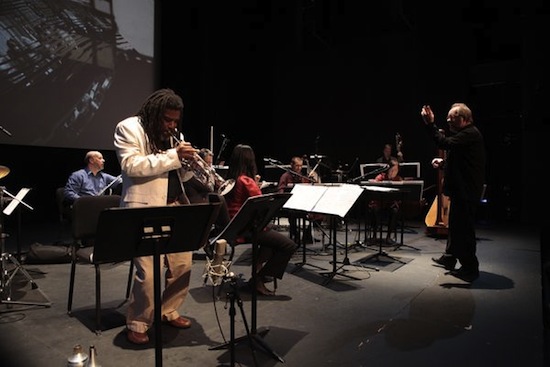Photo: Steven Gunther
Some 35 years in the making, jazz trumpeter and composer Wadada Leo Smith’s Ten Freedom Summers is a remarkable achievement. Partly inspired by playwright August Wilson’s ‘The Pittsburgh Cycle’, Smith’s monumental 19-movement suite explores the Civil Rights movement, celebrating its achievements and raising uncomfortable questions about racism and inequality in present-day America. For its UK premiere, Smith has split the work across three nights, of which I am reviewing the second, a collection of pieces entitled ‘What is Democracy?’ In a stripped down version of the large ensemble who recorded the 2012 studio version, Smith presents his own Golden Quartet (Anthony Davies on piano, Anthony Brown on drums and John Lindberg on bass) alongside the London-based Ligeti String Quartet, whose spiky modernism provides a bracing counterpoint to the jazz musicians’ bluesy riffs and melodies.
The innovative spirit of Chicago’s AACM (Association for the Advancement of Creative Musicians), of which Smith was an early member, runs through the performance, not only in its wide-ranging musical scope, but in its use of visuals: each piece is accompanied by artist Jesse Gilbert’s collage of archival photographs and graphics which are generated in real time in response to the music. In the absence of any spoken introductions or narrative elements, Gilbert’s visuals provide a powerful commentary on the issues raised by each movement. During the opening ‘Dred Scott’, for example, a celebration of the life of the freed slave which also meditates on ‘the issues of immigration, human rights and who can be an American’, Gilbert presents photographs of the US border patrol, a chilling reminder of the persistence of racist state violence. Gilbert’s approach is not entirely programmatic, however, with the more abstract graphics creating a more phenomenological impression of the music.
The first five movements are relatively recent compositions, beginning with ‘Dred Scott’, and moving through pieces which reflect on the pilgrimage of Malik Al Shabazz, aka Malcolm X, to Mecca, democracy, ‘the myth of the free press and corporate power’ and 9-11. The sixth and final movement, ‘Medgar Evers’ is the seed from which the whole suite grew, a tribute to the murdered Civil Rights leader, composed back in 1977. Throughout each movement the quartets perform both separately and together, creating a mix of avant-garde jazz and classical music that once might have been called Third Stream, but is arguably closer to the creative music of jazz visionaries like Anthony Braxton, Ornette Coleman and William Parker. This is not wild, free improvised jazz, but rather a set of carefully structured compositions within which there is room for improvisation, not least from Smith himself, whose terse, deeply considered trumpet parts cut through prickly thickets of piano and atonal strings with a keen edge. Sometimes he will just hold a long, aching note, modulating its intensity and tone with virtuosic breath control. At other points he’ll come in with compressed flurries and angry squalls, short statements which are utterly searing in their intensity.
Smith’s writing for strings is inspired, with traces of blues rhythm and tonality deftly woven into a modernist architecture of angular lines and dissonant textures. Playing this music for the first time, The Ligeti Quartet rise to the challenge with a vigorous display of extended techniques and pinpoint dynamics: stinging pizzicato, rattling bow-wood strikes, and eerie harmonics. During what appears to be an aleotoric section, the violinists lurch into a disorientating deluge of slurred notes and broken see-saw rhythms. Yet they also deliver moments of great beauty. On the encore of ‘Emmett Till’, Smith gives them the kind of radiant pyramid vaulting blocks of sound which graced Alice Coltrane albums like Lord of Lords and Universal Consciousness.
As for The Golden Quartet, well, they’re superb, with bassist John Lindberg holding the centre while Davies and Brown fill out the sound with gospel vamps, Cecil Taylor-like abstractions and free-bop propulsion. Lindberg’s textural work is gorgeous, as he bows fluttering drones and strums bold flamenco chords. With his long dreadlocks and immaculate linen suit, Smith is a charismatic presence, often crouching down to listen hard as the music moves around him, before rising to take a solo or introduce players with a wave of the arm. In a movement celebrating the 1995 Million Man March on Washington Smith leans in towards Brown’s kit, urging the drummer to bring the truth marching in on a steady crescendo.
An intense, beautiful evening ends with some fine words by Smith about the ongoing struggle for equality. The corporate sponsorship of London Jazz Festival by tax avoidance specialists EFG may leave a sour taste in the mouth, but at Oto tonight, the music’s radical spirit resounded through Smith’s eloquent freedom cry.


